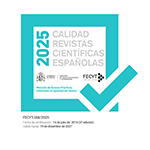Los constructores del Estado: los ingenieros españoles y el poder público en el contexto europeo (1840-1900)
Resumen
En España, los ingenieros constituyen uno de los ejemplos más importantes de élites profesionales. Su ascenso está estrechamente ligado al proceso de la construcción del Estado. Este artículo primero establece los rasgos principales que han caracterizado la ingeniería como campo de conocimiento y como profesión desde el siglo xviii. A continuación, ofrece una visión sintética de las paradojas del proceso lento y complejo de la construcción del Estado en España, prestando atención al papel ambiguo que los ingenieros desempeñaron en este proceso y a los límites de su acción. Por último, el texto debate el concepto del ingenierismo, que se entiende como: a) la tendencia de juzgar la intervención pública en términos de promover las obras públicas, y b) como las aspiraciones de los ingenieros al liderazgo socioprofesional y al reconocimiento público de tal liderazgo. El ingenierismo puede entenderse como una construcción social heredera de la representación social decimonónica de una relación estrecha entre las políticas públicas, el cambio técnico y la ingeniería en tal que profesión.
Descargas
Licencia
Aquellos autores/as que tengan publicaciones con esta revista, aceptan los términos siguientes:
a. Los autores/as conservarán sus derechos de autor y garantizarán a la revista el derecho de primera publicación de su obra, el cuál estará simultáneamente sujeto a la Licencia de reconocimiento de Creative Commons Reconocimiento-No comercial-Sin obra derivada 4.0 España que permite a terceros compartir la obra siempre que se indique su autor y su primera publicación esta revista.
b. Los autores/as podrán adoptar otros acuerdos de licencia no exclusiva de distribución de la versión de la obra publicada (p. ej.: depositarla en un archivo telemático institucional o publicarla en un volumen monográfico) siempre que se indique la publicación inicial en esta revista.
Plagio y fraude científico
La publicación de un trabajo que atente contra los derechos de propiedad intelectual será responsabilidad de los autores/as, que serán los que asuman los conflictos que pudieran tener lugar por razones de derechos de autor. Los conflictos más importantes pueden darse por la comisión de plagios y fraudes científicos.
Se entiende por plagio:
1.Presentar el trabajo ajeno como propio.
2.Adoptar palabras o ideas de otros autores sin el debido reconocimiento.
3.No emplear las comillas u otro formato distintivo en una cita literal.
4.Dar información incorrecta sobre la verdadera fuente de una cita.
5.El parafraseo de una fuente sin mencionar la fuente.
6.El parafraseo abusivo, incluso si se menciona la fuente.
Las prácticas constitutivas de fraude científico son las siguientes:
1.Fabricación, falsificación u omisión de datos y plagio.
2.Publicación duplicada.
3.Conflictos de autoría.












